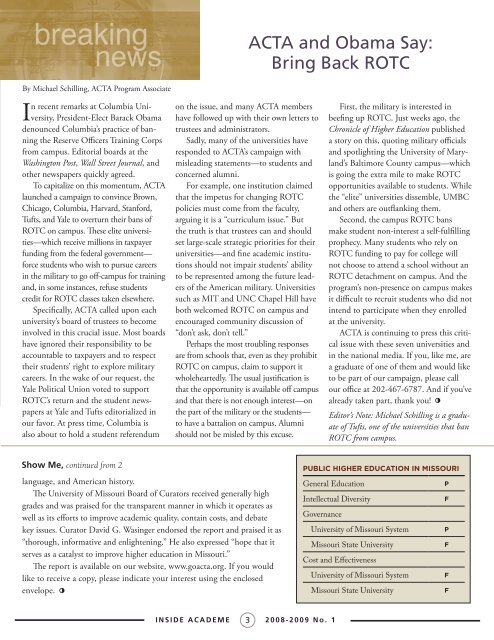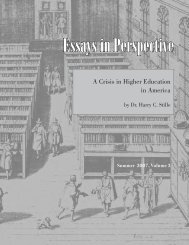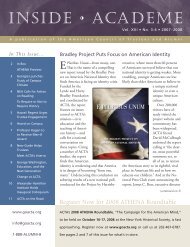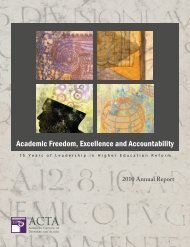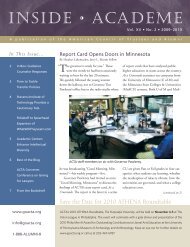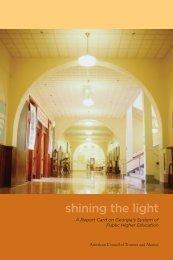Inside • Academe - The American Council of Trustees and Alumni
Inside • Academe - The American Council of Trustees and Alumni
Inside • Academe - The American Council of Trustees and Alumni
Create successful ePaper yourself
Turn your PDF publications into a flip-book with our unique Google optimized e-Paper software.
ACTA <strong>and</strong> Obama Say:<br />
Bring Back ROTC<br />
By Michael Schilling, ACTA Program Associate<br />
In recent remarks at Columbia University,<br />
President-Elect Barack Obama<br />
denounced Columbia’s practice <strong>of</strong> banning<br />
the Reserve Officers Training Corps<br />
from campus. Editorial boards at the<br />
Washington Post, Wall Street Journal, <strong>and</strong><br />
other newspapers quickly agreed.<br />
To capitalize on this momentum, ACTA<br />
launched a campaign to convince Brown,<br />
Chicago, Columbia, Harvard, Stanford,<br />
Tufts, <strong>and</strong> Yale to overturn their bans <strong>of</strong><br />
ROTC on campus. <strong>The</strong>se elite universities—which<br />
receive millions in taxpayer<br />
funding from the federal government—<br />
force students who wish to pursue careers<br />
in the military to go <strong>of</strong>f-campus for training<br />
<strong>and</strong>, in some instances, refuse students<br />
credit for ROTC classes taken elsewhere.<br />
Specifically, ACTA called upon each<br />
university’s board <strong>of</strong> trustees to become<br />
involved in this crucial issue. Most boards<br />
have ignored their responsibility to be<br />
accountable to taxpayers <strong>and</strong> to respect<br />
their students’ right to explore military<br />
careers. In the wake <strong>of</strong> our request, the<br />
Yale Political Union voted to support<br />
ROTC’s return <strong>and</strong> the student newspapers<br />
at Yale <strong>and</strong> Tufts editorialized in<br />
our favor. At press time, Columbia is<br />
also about to hold a student referendum<br />
on the issue, <strong>and</strong> many ACTA members<br />
have followed up with their own letters to<br />
trustees <strong>and</strong> administrators.<br />
Sadly, many <strong>of</strong> the universities have<br />
responded to ACTA’s campaign with<br />
misleading statements—to students <strong>and</strong><br />
concerned alumni.<br />
For example, one institution claimed<br />
that the impetus for changing ROTC<br />
policies must come from the faculty,<br />
arguing it is a “curriculum issue.” But<br />
the truth is that trustees can <strong>and</strong> should<br />
set large-scale strategic priorities for their<br />
universities—<strong>and</strong> fine academic institutions<br />
should not impair students’ ability<br />
to be represented among the future leaders<br />
<strong>of</strong> the <strong>American</strong> military. Universities<br />
such as MIT <strong>and</strong> UNC Chapel Hill have<br />
both welcomed ROTC on campus <strong>and</strong><br />
encouraged community discussion <strong>of</strong><br />
“don’t ask, don’t tell.”<br />
Perhaps the most troubling responses<br />
are from schools that, even as they prohibit<br />
ROTC on campus, claim to support it<br />
wholeheartedly. <strong>The</strong> usual justification is<br />
that the opportunity is available <strong>of</strong>f campus<br />
<strong>and</strong> that there is not enough interest—on<br />
the part <strong>of</strong> the military or the students—<br />
to have a battalion on campus. <strong>Alumni</strong><br />
should not be misled by this excuse.<br />
First, the military is interested in<br />
beefing up ROTC. Just weeks ago, the<br />
Chronicle <strong>of</strong> Higher Education published<br />
a story on this, quoting military <strong>of</strong>ficials<br />
<strong>and</strong> spotlighting the University <strong>of</strong> Maryl<strong>and</strong>’s<br />
Baltimore County campus—which<br />
is going the extra mile to make ROTC<br />
opportunities available to students. While<br />
the “elite” universities dissemble, UMBC<br />
<strong>and</strong> others are outflanking them.<br />
Second, the campus ROTC bans<br />
make student non-interest a self-fulfilling<br />
prophecy. Many students who rely on<br />
ROTC funding to pay for college will<br />
not choose to attend a school without an<br />
ROTC detachment on campus. And the<br />
program’s non-presence on campus makes<br />
it difficult to recruit students who did not<br />
intend to participate when they enrolled<br />
at the university.<br />
ACTA is continuing to press this critical<br />
issue with these seven universities <strong>and</strong><br />
in the national media. If you, like me, are<br />
a graduate <strong>of</strong> one <strong>of</strong> them <strong>and</strong> would like<br />
to be part <strong>of</strong> our campaign, please call<br />
our <strong>of</strong>fice at 202-467-6787. And if you’ve<br />
already taken part, thank you!<br />
<strong>•</strong><br />
Editor’s Note: Michael Schilling is a graduate<br />
<strong>of</strong> Tufts, one <strong>of</strong> the universities that ban<br />
ROTC from campus.<br />
Show Me, continued from 2<br />
language, <strong>and</strong> <strong>American</strong> history.<br />
<strong>The</strong> University <strong>of</strong> Missouri Board <strong>of</strong> Curators received generally high<br />
grades <strong>and</strong> was praised for the transparent manner in which it operates as<br />
well as its efforts to improve academic quality, contain costs, <strong>and</strong> debate<br />
key issues. Curator David G. Wasinger endorsed the report <strong>and</strong> praised it as<br />
“thorough, informative <strong>and</strong> enlightening.” He also expressed “hope that it<br />
serves as a catalyst to improve higher education in Missouri.”<br />
<strong>The</strong> report is available on our website, www.goacta.org. If you would<br />
like to receive a copy, please indicate your interest using the enclosed<br />
envelope.<br />
<strong>•</strong><br />
PUBLIC HIGHER EDUCATION IN MISSOURI<br />
General Education<br />
P<br />
Intellectual Diversity<br />
F<br />
Governance<br />
University <strong>of</strong> Missouri System<br />
P<br />
Missouri State University<br />
F<br />
Cost <strong>and</strong> Effectiveness<br />
University <strong>of</strong> Missouri System<br />
F<br />
Missouri State University<br />
F<br />
INSIDE ACADEME 3 2008-2009 No. 1


